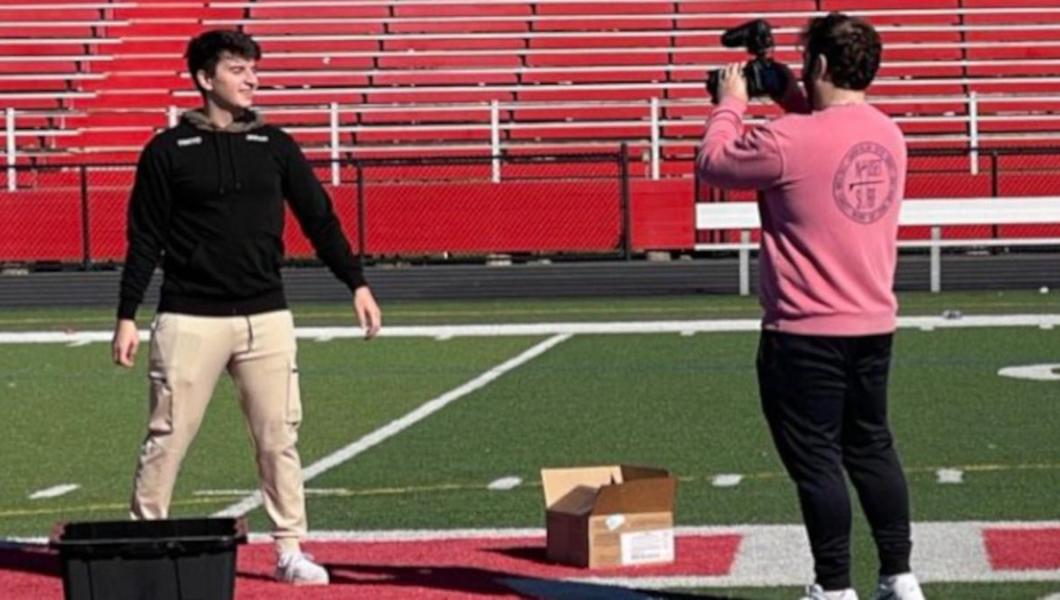Entrepreneur Lands Job at Venture For America, Defers Med School

Parth Agrawal, a 2021 biomedical engineering graduate and Albert Dorman Honors scholar, was accepted to the Rutgers New Jersey Medical School. But he’s not going – right away, at least. He deferred admission for a two-year fellowship with Venture For America, a nonprofit organization that trains recent college graduates to work in startups in cities across the country.
Anyone who knows Parth shouldn’t be surprised at this decision. His ingenuity shined through the darkness of the pandemic when the Albert Dorman Honors College issued a call for design submission for face shields, in response to a request from alumnus Biren Bhatt, an ER doctor. The designers of the best face shield would win a prize, but that might not have landed Agrawal the Venture for America fellowship.
“We thought we could make a home face shield design and knock out a few hundred in our basement,” said Agrawal. “But we saw people sitting at home wanting to help.”
What came next was a crash course in entrepreneurship. Agrawal and a small group of friends created a scalable volunteer organization to build and distribute face shields across North Jersey. Called the “Common Health Project,” the group raised $5,000, created a website, and recruited 200 volunteers to work both as drivers and face shield makers. The organization pushed out 1,000 face shields per week for 20 weeks, delivering to 50 facilities including nursing homes, hospitals, and the Newark Office of Emergency Management.
CommonHealthProject.Parth Agrawal.IMG_20200405_165718 copy.jpg

“Alone a youth runs fast, with an elder slow, but together they go far.” – Luo Proverb
Novice visionaries need mentorship and education. Behind every founder there are support figures and institutions that cultivate an entrepreneurial ethos. In Agrawal’s case, that person was Vatsal Shah, president of the NJIT Alumni Association and faculty fellow with the Albert Dorman Honors College. Shah and Agrawal first met and struck conversation about the face shield project at an alumni event in Manhattan. The day after the event, Parth did something simple that most do not. He sent a thank you email.
“It’s simple, but that’s what separated Parth from everyone else,” 'said Shah, '08, M.S. '09, Ph.D. '14. “It’s not always what you know, but who you know. You need someone who wants to lift you up.”
Shah lifted much early on. He was the Common Health Project’s first donor. He even helped work the phones.
“My role as a mentor was to be a sounding board. I don’t give any answers, just support,” said Shah. “I want to help avoid burnout when young people try doing too much. At some point, it becomes about everyone else and leaning on others.”
Highlander Foundry, an on-campus startup incubator run through VentureLink, was a major pillar of support. Will Lutz, general manager for Entrepreneurship and Commercialization at NJII and managing director of VentureLink, offered mentorship and guidance to the group throughout the process.
NJIT’s Makerspace helped provide materials but lacked the labor power to safely assemble face shields on campus due to social distancing rules. It’s how the idea of a decentralized, distributed network of quarantined worker elves came about.
Even though we were totally volunteer-run and didn’t make profit, I think it was a fantastic representation of what it’s like to run a startup.
In the end, all that labor turned up no financial profit – an entrepreneurial contradiction in the eyes of a lay person. So, what can one learn from a nonprofit startup?
“Even though we were totally volunteer-run and didn’t make profit, I think it was a fantastic representation of what it’s like to run a startup,” said Agrawal. “We had deliverables. We were prototyping. It was a design process. We had to tweak it and change it over time. We ran the Common Health Project like a startup from day one using lean startup principles. It’s one of the fastest and most efficient ways to build an organization.”
The 20-week project didn’t come without setbacks and mistakes – a core feature of learning the ropes of the business world.
“A big mistake I made was not leaning on my team members enough when working on the vision,” said Agrawal. “One of our strengths was vulnerability, but if I had been more open with them about where I was struggling, things would have gone much better.”
Agrawal has few complaints and even fewer regrets. For him, organization-building is a means to a solution.
“It’s what I love about entrepreneurship. It can be a catalyst that turns into real civic impact,” said Agrawal. “I fell in love with engineering because I felt it empowered me to go beyond studying the world and the body, but to open it up and tinker with things. I found a way to turn that technical knowledge into impact.”
Venture For America is now in the process of matching Agrawal with a startup in one 13 cities - with none in New Jersey. Agrawal, who grew up in Montville and spent all his life in the state, is excited to spread his wings.
“The most important thing I need now is to explore my growing passion for entrepreneurship and the opportunity to pursue that in a brand-new city,” said Agrawal. “It’s going to be really important for my personal and professional growth.”
Surely, Parth Agrawal will soon find better solutions to bigger problems. Med school can wait.

